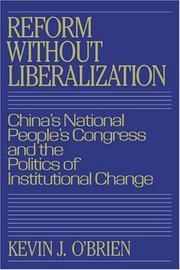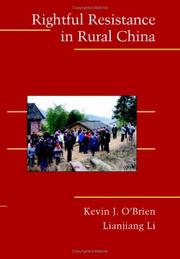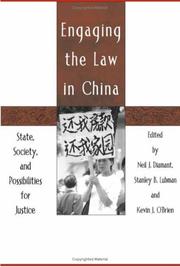| Listing 1 - 10 of 15 | << page >> |
Sort by
|

ISBN: 0521380863 0521048206 0511664192 Year: 1990 Publisher: New York Cambridge Sydney Cambridge University Press
Abstract | Keywords | Export | Availability | Bookmark
 Loading...
Loading...Choose an application
- Reference Manager
- EndNote
- RefWorks (Direct export to RefWorks)
Since its founding in 1954, the National People's Congress of China (NPC) has followed a difficult course of development, a course which has been characterized by periods of limited progress intermingled with periods of stagnation and regression. Political campaigns from the Anti-Rightist Movement (1957-1958) to the Great Leap Forward (1958-1960) to the Cultural Revolution (1966-1976) frustrated the establishment of any consistent policy concerning the appropriate role of the legislature within the one-party, Maoist regime. Mao's death in 1976, however, ushered in a new era of political reform which has included the strengthening of the NPC. In this detailed study of the NPC, Kevin O'Brien examines how the NPC has changed from its founding under Mao through the regime of Deng Xiaoping. He describes the various functions it has served, from the management of intra-elite relations; to the incorporation, and co-optation, of criticisms of regime policies into regime debates; to legislation and supervision of government agencies.
S06/0220 --- China: Politics and government--People's Republic: general --- China. Ch'uan kuo jen min tai piao ta hui --- China --- Politics and government --- -S06/0220 --- Cina --- Kinë --- Cathay --- Chinese National Government --- Chung-kuo kuo min cheng fu --- Republic of China (1912-1949) --- Kuo min cheng fu (China : 1912-1949) --- Chung-hua min kuo (1912-1949) --- Kina (China) --- National Government (1912-1949) --- China (Republic : 1912-1949) --- People's Republic of China --- Chinese People's Republic --- Chung-hua jen min kung ho kuo --- Central People's Government of Communist China --- Chung yang jen min cheng fu --- Chung-hua chung yang jen min kung ho kuo --- Central Government of the People's Republic of China --- Zhonghua Renmin Gongheguo --- Zhong hua ren min gong he guo --- Kitaĭskai︠a︡ Narodnai︠a︡ Respublika --- Činská lidová republika --- RRT --- Republik Rakjat Tiongkok --- KNR --- Kytaĭsʹka Narodna Respublika --- Jumhūriyat al-Ṣīn al-Shaʻbīyah --- RRC --- Kitaĭ --- Kínai Népköztársaság --- Chūka Jinmin Kyōwakoku --- Erets Sin --- Sin --- Sāthāranarat Prachāchon Čhīn --- P.R. China --- PR China --- Chung-kuo --- Zhongguo --- Zhonghuaminguo (1912-1949) --- Zhong guo --- Chine --- République Populaire de Chine --- República Popular China --- Catay --- VR China --- VRChina --- 中國 --- 中国 --- 中华人民共和国 --- Jhongguó --- Bu̇gu̇de Nayiramdaxu Dundadu Arad Ulus --- Bu̇gu̇de Nayiramdaqu Dumdadu Arad Ulus --- Bu̇gd Naĭramdakh Dundad Ard Uls --- Khi︠a︡tad --- Kitad --- Dumdadu Ulus --- Dumdad Uls --- Думдад Улс --- Kitajska --- China. --- Quan guo ren min dai biao da hui (China) --- 全国人民代表大会 (China) --- China (People's Republic of China, 1949- ). --- Vsekitaĭskoe sobranie narodnykh predstaviteleĭ (China) --- All-China People's Congress --- Zhonghua Renmin Gongheguo quan guo ren min dai biao da hui --- Zhonghua Renmin Gongheguo Quanguo Renmin Daibiao Dahui --- 中华人民共和国全国人民代表大会 --- National People's Congress of the People's Republic of China --- Nationaler Volkskongress (China) --- NPC --- N.P.C. --- VSNP --- 1949 --- -China. Ch'üan kuo jen min tai piao ta hui. --- China - Politics and government - 1949 --- -China --- -Social Sciences --- Political Science --- -China. --- Social Sciences --- China. Ch'üan kuo jen min tai piao ta hui. --- China - Politics and government - 1949-
Book
ISBN: 1626164363 9781626164369 9781626164345 Year: 2017 Publisher: Washington, DC
Abstract | Keywords | Export | Availability | Bookmark
 Loading...
Loading...Choose an application
- Reference Manager
- EndNote
- RefWorks (Direct export to RefWorks)
It is beyond debate that human beings are the primary cause of climate change. Many think of climate change as primarily a scientific, economic, or political problem, and those perspectives inform Kevin O'Brien's analysis. But O'Brien argues that we should respond to climate change first and foremost as a case of systematic and structural violence. As he points out, global warming is primarily caused by the carbon emissions of the affluent, emissions that harm the poor first and worst. Climate change divides human beings from one another and from the earth; in short, global warming and climate change is violence. In order to sustain a constructive and creative response to this violence, he contends, society needs practical examples of activism and nonviolent peacemaking. O'Brien identifies five such examples from US history, providing brief biographies of heroic individuals whose idealism and social commitment and political savvy can model the fight against climate change and for climate justice: Quaker abolitionist John Woolman; social reformer Jane Addams; Catholic worker advocate Dorothy Day; civil rights leader Martin Luther King, Jr.; and union organizer Cesar Chavez. These moral exemplars, all of whom were motivated by their Christian faith, serve as witnesses to those seeking to make peace in response to the violence of climate change.
Climatic changes --- Global warming. --- Anthropogenic effects on climatic changes --- Human ecology --- Global warming --- Warming, Global --- Global temperature changes --- Greenhouse effect, Atmospheric --- Effect of human beings on. --- Social aspects. --- Environmental aspects
Book
ISBN: 9781589016453 1589016459 Year: 2010 Publisher: Washington, D.C. Georgetown University Press
Abstract | Keywords | Export | Availability | Bookmark
 Loading...
Loading...Choose an application
- Reference Manager
- EndNote
- RefWorks (Direct export to RefWorks)
Biodiversity --- Human ecology --- Religious aspects --- Christianity
Book
ISBN: 1589016645 9781589016644 1589016459 9781589016453 9781589016453 Year: 2010 Publisher: Washington, D.C. Georgetown University Press
Abstract | Keywords | Export | Availability | Bookmark
 Loading...
Loading...Choose an application
- Reference Manager
- EndNote
- RefWorks (Direct export to RefWorks)
Life on earth is wildly diverse, but the future of that diversity is now in question. Through environmentally destructive farming practices, ever-expanding energy use, and the development and homogenization of land, human beings are responsible for unprecedented reductions in the variety of life forms around us. Estimates suggest that species extinctions caused by humans occur at up to 1,000 times the natural rate, and that one of every twenty species on the planet could be eradicated by 2060.An Ethics of Biodiversity argues that these facts should inspire careful reflection and action in Chri
Human ecology --- Biodiversity. --- Religious aspects --- Christianity.
Book
ISBN: 9781626164352 Year: 2017 Publisher: Washington (D.C.) Georgetown University Press
Abstract | Keywords | Export | Availability | Bookmark
 Loading...
Loading...Choose an application
- Reference Manager
- EndNote
- RefWorks (Direct export to RefWorks)

ISBN: 0521678528 0521861314 9780521861311 9780521678520 9780511791086 0511161611 9780511161612 0511791089 9780511160882 0511160887 0511191685 9780511191688 1107156491 1280458224 0511160313 0511312555 9780511312557 Year: 2006 Publisher: Cambridge : Cambridge University Press,
Abstract | Keywords | Export | Availability | Bookmark
 Loading...
Loading...Choose an application
- Reference Manager
- EndNote
- RefWorks (Direct export to RefWorks)
How can the poor and weak 'work' a political system to their advantage? Drawing mainly on interviews and surveys in rural China, Kevin O'Brien and Lianjiang Li show that popular action often hinges on locating and exploiting divisions within the state. Otherwise powerless people use the rhetoric and commitments of the central government to try to fight misconduct by local officials, open up clogged channels of participation, and push back the frontiers of the permissible. This 'rightful resistance' has far-reaching implications for our understanding of contentious politics. As O'Brien and Li explore the origins, dynamics, and consequences of rightful resistance, they highlight similarities between collective action in places as varied as China, the former East Germany, and the United States, while suggesting how Chinese experiences speak to issues such as opportunities to protest, claims radicalization, tactical innovation, and the outcomes of contention.
Peasants --- Paysannerie --- Political activity --- Activité politique --- China --- Chine --- Rural conditions. --- Conditions rurales --- S11/0485 --- S11/0709 --- S11/0920 --- S11/0534 --- S06/0225 --- S06/0262 --- S06/0500 --- #SBIB:328H52 --- #SBIB:324H73 --- China: Social sciences--Rural change --- China: Social sciences--Cadres (incl. political commissars) --- China: Social sciences--Corruption --- China: Social sciences--Class studies --- China: Politics and government--People's Republic: local and provincial government: since 1976 --- China: Politics and government--Mass line, mass criticism --- China: Politics and government--Other modern political movements (e.g. anarchism, Socialism, dissident movements, Beijing Spring, Tian'anmen) --- Instellingen en beleid: China --- Politieke verandering: oppositie en minderheid, protest, politiek geweld --- Activité politique --- Peasantry --- Agricultural laborers --- Rural population --- Marks (Medieval land tenure) --- Villeinage --- Social Sciences --- Political Science --- Actualité politique --- Situation rurale --- Political activity.
Book
ISBN: 9780674030619 0674030613 9780674030602 0674030605 0674041585 9780674041585 0674266307 Year: 2008 Publisher: Cambridge, Mass. : Harvard University Press,
Abstract | Keywords | Export | Availability | Bookmark
 Loading...
Loading...Choose an application
- Reference Manager
- EndNote
- RefWorks (Direct export to RefWorks)
Unrest in China, from the dramatic events of 1989 to more recent stirrings, offers a rare opportunity to consider how popular contention unfolds in places where speech and assembly are tightly controlled. The contributors to this volume argue that ideas inspired by social movements elsewhere can help explain popular protest in China.
Social movements --- Political participation --- Mouvements sociaux --- Participation politique --- S06/0500 --- S11/0830 --- S20/0500 --- China: Politics and government--Other modern political movements (e.g. anarchism, Socialism, dissident movements, Beijing Spring, Tian'anmen) --- China: Social sciences--Labour conditions and trade unions: since 1949 --- China: Agriculture forestry, fishery, natural disasters--Environmental policy, pollution --- Movements, Social --- Social history --- Social psychology --- Chine
Digital
ISBN: 9780674041585 9780674030619 Year: 2009 Publisher: Cambridge, Mass. Harvard University Press
Abstract | Keywords | Export | Availability | Bookmark
 Loading...
Loading...Choose an application
- Reference Manager
- EndNote
- RefWorks (Direct export to RefWorks)
Book
ISBN: 1630876240 9781630876241 9781608999897 1608999890 Year: 2011 Publisher: Eugene, Oregon
Abstract | Keywords | Export | Availability | Bookmark
 Loading...
Loading...Choose an application
- Reference Manager
- EndNote
- RefWorks (Direct export to RefWorks)
Human ecology --- Ecology --- Environment, Human --- Human beings --- Human environment --- Ecological engineering --- Human geography --- Nature --- Religious aspects --- Social aspects --- Effect of environment on --- Effect of human beings on

ISBN: 9780804750486 Year: 2005 Publisher: Stanford (Calif.) University Press
Abstract | Keywords | Export | Availability | Bookmark
 Loading...
Loading...Choose an application
- Reference Manager
- EndNote
- RefWorks (Direct export to RefWorks)
| Listing 1 - 10 of 15 | << page >> |
Sort by
|

 Search
Search Feedback
Feedback About UniCat
About UniCat  Help
Help News
News